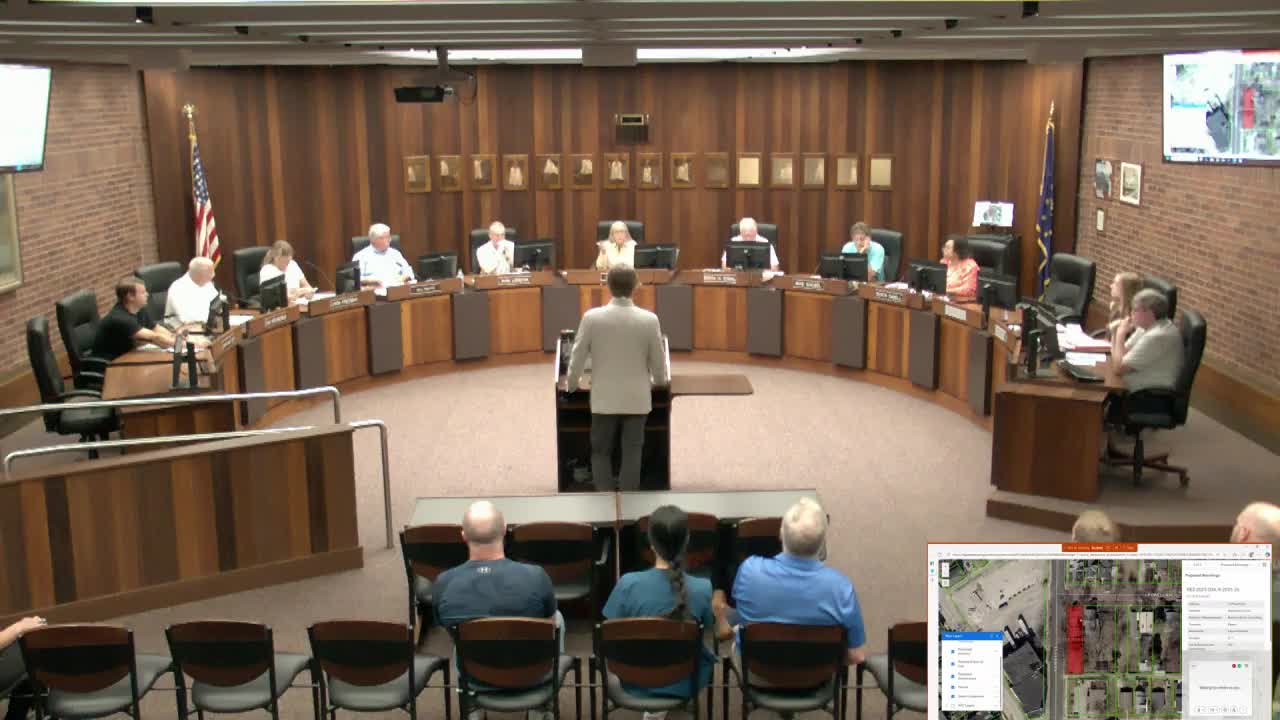Valparaiso Planning Commission Reviews Historic Property Rezoning Concerns
October 02, 2025 | Evansville City, Vanderburgh County, Indiana
This article was created by AI summarizing key points discussed. AI makes mistakes, so for full details and context, please refer to the video of the full meeting. Please report any errors so we can fix them. Report an error »

The Evansville Area Plan Commission meeting on October 2, 2025, highlighted significant discussions regarding the potential redevelopment of a historic property, raising concerns about zoning, community impact, and housing needs.
One of the central topics was the proposal to convert a historic structure into a multi-unit dwelling. The property, recognized as a "contributing structure" due to its historical significance, has been a point of contention among community members. Residents expressed worries about the implications of increasing the number of rental units from two to four, particularly regarding parking and neighborhood aesthetics. Concerns were raised about the potential transformation of green space into a parking lot, which could detract from the area's charm.
Local resident Brian Broyles, who has invested in nearby properties, emphasized the importance of maintaining the character of the neighborhood. He suggested that keeping the property as a two-unit dwelling would not only preserve its integrity but also align with the community's needs for quality housing. Broyles noted that recent investments in the area, including a $9 million renovation project, have significantly enhanced property values and community appeal.
Shauna Jarboe, representing the United Neighborhoods of Evansville, voiced additional concerns about the proposed site plan, which lacked details on access for upper units and did not meet the required parking specifications. She highlighted that the design appeared to favor roommate-style living rather than single-family use, raising questions about compliance with local housing ordinances.
In response, the developer clarified that the project is intended for multifamily use and assured that the existing structure would remain intact. They emphasized their commitment to high-quality renovations, aiming to address the local housing shortage while maintaining the neighborhood's aesthetic.
The discussions underscored the delicate balance between development and preservation in Evansville. As the city grapples with housing demands, the outcomes of this proposal could set a precedent for future developments, impacting both the community's character and its housing landscape. The Area Plan Commission will continue to review the proposal, considering community feedback and zoning regulations in their decision-making process.
One of the central topics was the proposal to convert a historic structure into a multi-unit dwelling. The property, recognized as a "contributing structure" due to its historical significance, has been a point of contention among community members. Residents expressed worries about the implications of increasing the number of rental units from two to four, particularly regarding parking and neighborhood aesthetics. Concerns were raised about the potential transformation of green space into a parking lot, which could detract from the area's charm.
Local resident Brian Broyles, who has invested in nearby properties, emphasized the importance of maintaining the character of the neighborhood. He suggested that keeping the property as a two-unit dwelling would not only preserve its integrity but also align with the community's needs for quality housing. Broyles noted that recent investments in the area, including a $9 million renovation project, have significantly enhanced property values and community appeal.
Shauna Jarboe, representing the United Neighborhoods of Evansville, voiced additional concerns about the proposed site plan, which lacked details on access for upper units and did not meet the required parking specifications. She highlighted that the design appeared to favor roommate-style living rather than single-family use, raising questions about compliance with local housing ordinances.
In response, the developer clarified that the project is intended for multifamily use and assured that the existing structure would remain intact. They emphasized their commitment to high-quality renovations, aiming to address the local housing shortage while maintaining the neighborhood's aesthetic.
The discussions underscored the delicate balance between development and preservation in Evansville. As the city grapples with housing demands, the outcomes of this proposal could set a precedent for future developments, impacting both the community's character and its housing landscape. The Area Plan Commission will continue to review the proposal, considering community feedback and zoning regulations in their decision-making process.
View full meeting
This article is based on a recent meeting—watch the full video and explore the complete transcript for deeper insights into the discussion.
View full meeting
